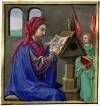With Christmas Day now past, the 12 days of the Feast roll onward. Today there are three French Hens perched outside my study window as I draw together the prayers for the Feast of Holy Innocents tomorrow, and our opportunity to commemorate lost children whose days on earth were short-lived. In these small communities I know of about 12 families who have undergone such a loss, but I do not impose this remembrance upon then by including the names of their children without their knowledge or consent. As it is, I so far have two names to read out, one being that of my mother’s infant sister who only lived a few days. Up until about five years ago, when I did some research at the Family History Centre in London, my mother never knew why her sister died, but when I located and obtained a copy of the death certificate, it was revealed. No major surprises as it was due to illness, but to a certain extent it provided closure on that episode of her past. And this is the purpose of all remembrance – not so much to hear the names again, though this is valuable, but to complete the circle - to recognise the loss and thereby to rob it of its power.
In a way, the remembrance of Christ’s birth at Bethlehem closes a circle, and begins it again. The annual cycle of Christian Feasts and Festivals take us from before the birth, through the life, death and resurrection, and onward into the operations of the Holy Spirit, who has been there from the beginning, and who therefore was there with the Word that is made flesh, and so on ….
In this yearly celebration of light in darkness, the remembrance is strongest for those who see beyond the commercialism and secularisation and look to the manger throne. For those of us who can see the significance of this birth, Christmas is more than just remembrance. It’s part of the cycle of faith in our own lives that gives meaning to who and what we are. We are more than mere fireflies, here for a span and then extinguished in the dark. We have a significance that is greater than the sum of our parts. Our existence is bound up with the Word that is the light and life of all people, and which the darkness cannot overwhelm, no matter what human losses are suffered along the way.
Three French Hens sing their Trinitarian song for this season of festivities. Tomorrow the Four Calling Birds will invite us to the Eucharist, and along with the Innocents and other lost children we shall remember and celebrate the gift of God’s only-begotten Son.
Subscribe to:
Post Comments (Atom)





So where does the ping-pong table fit into all of this?
ReplyDeleteer ... what ping-pong table?
ReplyDeleteThe ping pong table that is iconic of the Incarnation - your idea!
ReplyDeleteAh - THAT ping-pong table ... now, if you'd said "table-tennis table" I'd have understood ...
ReplyDelete(and if you're half-way through this exchange, look on here for the relevant blog and comments - http://hamptonsramblings.blogspot.com/)
So, the question really is, how can the image of the to-and-fro of our relationship with God (ie: the table-tennis table) be compatible with this cyclic understanding as expressed in this posting?
Damn it - I don't know ... I'm just a vicar .... trying his best to make the faith relevant ....
Let me mull on it over another turkey sandwich ...